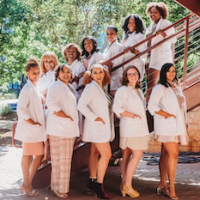Although below the national average, the breastfeeding rates among non-Hispanic Black/African American mothers is increasing in the United States. Similar trends are found in North Carolina.
One way to increase these numbers is to train more lactation experts who can promote and teach the benefits of breastfeeding directly to mothers. That is one of the goals of the RISE: Lactation Training Model project, a Carolina Global Breastfeeding Institute (CGBI) program that aims to increase the number of lactation consultants through more training programs in communities of color.
“Essentially, it’s creating more IBCLCs [International Board-Certified Lactation Consultants] of color. It’s estimated that less than 5 percent of lactation consultants are black,” said Alexis Woods Barr, a CGBI Postdoctoral Research Fellow with the RISE project. “The issue is essentially black people want to gravitate to people who look like them. If we can increase the number of lactation consultants of color, hopefully we can ultimately increase the number of women who are breastfeeding.”

NCAT Human Lactation Pathway 2 Certificate program 2020-2021 cohort (courtesy Ciara Sherae Photography)
One of the major initiatives of the RISE program is to reduce health disparities in communities of color by supporting the development of self-sustaining lactation consultant training programs at HBCUs (historically black colleges and universities). By housing Pathway 2 programs in HBCUs, RISE is helping build a self-sustaining infrastructure within the university setting. Increasing the number of medical experts of color can drive up the breastfeeding rate in these communities.
“CGBI is setting the trend right now on how we can more effectively help communities of color, saying this is how you breastfeed. They’re taking different avenues to increase breastfeeding rates among the black community. Very commendable,” said Woods Barr.
When RISE started in 2018, there were no accredited lactation programs available at HBCUs. With assistance through RISE, there are now Pathway 2 programs to prepare students to become IBCLCs in two HBCUs: Johnson C. Smith University (JC Smith) in Charlotte, North Carolina, and North Carolina Agricultural & Technical State University (NCAT) in Greensboro.
JC Smith was the first HBCU to have a Pathway 2 Lactation program in the country. Due to COVID-19, both their first and second cohorts had their graduation ceremony this year. “We are so very proud of all 11 graduates! The 4 (“fantastic four”) from cohort 1 are all employed IBCLCs and the 7 (“spectacular seven”) from cohort 2 are preparing to sit for their exam,” said the program’s director Ta’Hysha McClain. “There’s a different story behind each one of these faces, but they all share a passion for the work we do and for achieving health equity for all. They deserve all the wonderful things headed their way!”
The NCAT Human Lactation Pathway 2 Certificate program graduated their first 11 lactation consultants in 2021. “CGBI along with the RISE program have been instrumental in providing us with start-up funds to implement our Pathway 2 program here at NCAT,” said Janiya Williams, an IBCLC and the program’s director. “These women were not only ready to sit for the board-certified lactation examination, but they will also change the entire lactation profession and the communities they work in. We look forward to graduating our next cohort soon.”
“There’s a different story behind each one of these faces, but they all share a passion for the work we do and for achieving health equity for all.” — Ta’Hysha McClain, JC Smith Pathway 2 Lactation Program Director
Being a part of the RISE program has taught Woods Barr that making equitable change is difficult, but it’s worth it. “It’s a labor of love so to speak. It’s more than just talking,” she said. “I certainly don’t want us to drop the ball on some of these communities that have been burnt from institutions coming in, getting what we want, and getting back out. That’s what drew me to CGBI. It seems like they’re doing the work.”
Each black lactation expert in a birth setting provides long-lasting benefits to those they serve. “I think that the idea for this is amazing. And, it’s not been done before,” said Woods Barr. “If other schools can jump on board, instead of graduating ten people per year, at multiple schools it could be 40 people per year. Over time, this could be really beneficial to the community.”
Learn more about the Lactation Consultant Training Program at JC Smith and the Human Lactation Pathway 2 Certificate program at NCAT.
— By Robert A. Poarch
